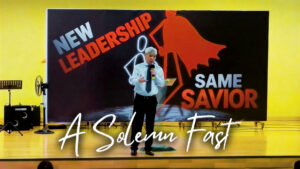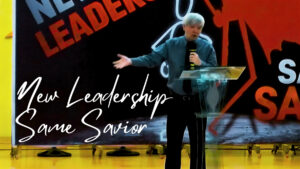Scripture Reading: Acts 10:38; Galatians 2:10
Acts 10:38
“How God anointed Jesus of Nazareth with the Holy Spirit and with power: who went about doing good, and healing all that were oppressed with the devil for God was with Him.’
Galatians 2:10
‘Only they would that we should remember the poor; the same which I also was forward to do.’
We are going to launch our next essential for the second quarter of the year; April to June and the emphasis will be on Essential Community. Under Essential Community I learned that as a disciple, I am a friend to the community. I will grow in compassion and have acceptance of people by engaging the community. What can we learn from these two portions of scriptures?
1. Jesus Remembered the Poor
The intended meaning of Acts 10:38 is obvious. Firstly, Jesus remembered the poor. Actually Christ, the Eternal God chose to be poor, came amongst us and drew near to each of us. Secondly Jesus went about promoting the well being of men wherever He went. Jesus had lived a life of selfless service for others, doing good and healing all who were oppressed by the devil. The phrase, ‘Jesus of Nazareth’ implied that Jesus was born there and at the place he was born he went around, travelling all over Judea for three years, so that no area was without his good deeds. Thirdly He did what He could wisely do for the bodies of men, healing the sick, supplying physical wants, but more especially He sought to promote the highest spiritual good of the people; teaching, warning, rebuking and entreating, as circumstances seemed to require. His intention: promoting the highest human happiness by every means in his power. History shows Jesus amply did it. Wherever he went He was a benefactor to the people and God was with him. God enabled Jesus to perform the task he set about to do. Before Jesus promote the spiritual well being of the people, He went about promoting the well being for the physical bodies. Before you share to people about Christ, you do your community work; you feed them, meet the needs of the poor and needy. And most likely they will listen to you. He walked the talk as we say in our days. He fed 5,000 at one time and another 4000 at another stretch. In 2001 in Australia, a former restaurant owner who started an organization called ‘Just Enough Faith’ invited 1,000 special guests and transported them on luxury coaches to a secret location. I want you to imagine the convoy of the luxury coaches. I believe there were at least 40 coaches moving in a convoy. They were driven to Sydney’s Regent Hotel and treated to a sumptuous meal prepared by the best chefs in the city. I suppose the banquet hall must be one gigantic ballroom to accommodate 1000 guests. Who were these 1000 guests? They were not the elite of the city, but the homeless from the streets of Sydney. They were the poor and needy. And since then every Christmas they were treated to a meal normally reserved for the rich and famous. They did it once a year. I believe we should also remember the poor. We should promote the well-being of men wherever we go. We should do what we could and do it wisely. What a wonderful image of the banquet given by God described by the Lord Jesus in Luke 14:12-14, where the poor, the maimed, the lame and the blind were invited. This is the heart of God. When preparing this sermon, I was surprised at the story of the feeding of the 1000 poor and needy in Sydney because, it, kind of confirmed what we are doing is of God. We started our own ‘One good meal’ more than 10 years ago because we noticed that most Filipino family doesn’t have three meals a day. And their meal that they can have, is such that they will have a heap of rice with just a small piece of meat or a small fish or just noodles with rice or just vegetables. I remember that I was in Zamboanga del Sur, in a town called Ipil and I witnessed a family whose lunch that day was balunggay leaves soup poured over a heap of rice. And there was no spoon, just a plate on one hand and five fingers on the other hand poring over the rice and putting them into the mouth. At another one time I was in Mindoro Oriental in a town called Bongabong and I was invited for dinner where there were just 5 small fishes on the table with rice. I thought this sudan was just meant for my partner and I. But immediately after my partner and I finished my food, 4 or 5 children consumed what was left over by me. I have never felt so guilty after a dinner. I know that Filipino hates vegetables because it is the cheapest and they have to eat it every day. We just want to give 1000 people living in our surrounding communities a proper meal with a few sudan, desert and rice. We want to be like Jesus; do what we could wisely for the bodies of men. Supplying physical wants and of course promoting spiritual well-being.
I pray that God will open our eyes, so that we can see the poor that are all around us. I know that the term ‘poor’ is a relative term. They may not be in abject poverty in a more affluent country or city but they were always be people who barely have enough. They are out there in our communities. They are within the radius of our church building. The DNA of this church from the beginning has always been touching the marginalized people. They are outside the four walls of this church. They are our neighbors. Peter, James and John; these reputed leaders and pillars of the founding church had just one instruction to Paul and Barnabas (the sent-out missionaries). Paul said it so clearly concerning the instruction given to them by Peter, James and John; ‘All they asked was that we should continue to remember the poor’; the very thing that Paul was eager to do. It was the concern for the poor which brought Paul to Jerusalem in order to bring them financial relief. It was the same concern that motivated him on his third missionary journey to raise large welfare offerings for the needy. Such offerings would alleviate human suffering and demonstrate genuine concern for others.
2. What Was Implied by Going About Doing Good?
What do you mean by going about doing good? Firstly, it implied it is his business – the thing He had above all things else at heart. For this reason, Jesus came into the world. Jesus came to do good and not evil: to bless and not to curse; to fill the world with peace, love and happiness, so far as long as it is within his range of influence. The good of man was the great object which He sought.
Secondly, it implied He valued their well-being. He loved and enjoyed the efforts He made to promote the well being of mankind. Jesus was truly and honestly benevolent and because He loved the happiness of men, he labored to promote it.
3. What was Jesus’ Motive for Going About Doing Good?
Firstly, the cry of the Poor. In a world of 7 billion people (to be exact it is 7.7 billion people), just 8 men owns half of the world’s wealth, one billion owns 80 percent of the wealth of the world. Another billion struggle to survive on a dollar a day. Two billion people have no access to clean water; 150 million children never get the chance to go to school; more than 40 million people in developing countries are HIV positive, with little hope of ever receiving treatment. Let’s bring it closer to home. There are 109 million people in the Philippines. Just two Chinese families controls 25% of the economy of the Philippines. 10 percent owns 80 percent of the wealth of this country. 25% live below the poverty line and 12 million Filipinos lived in extreme poverty. In 5 years’, time, the population of the world will reach 8 billion people. The saddest part is that the vast majority of this population growth will be in the poorest nations, born with the prospect of growing up in poverty and unemployment, disillusioned with a world that they would view as inequitable and unjust. Proverbs 21:13 tells us ‘If a man shuts his ears to the cry of the poor, he too will cry out and not be answered.’ I want you to mediate on this verse. Could this be the reason some of our prayers are not answered? Are there poor people whom God has allowed to cross our paths and we have shut our ears to their cries? Does this remind us of James 5:3-4, ‘You have hoarded wealth in the last days. Look! The wages you failed to pay the workmen who moved your fields are crying out against you. The cries of the harvesters have reached the ears of the Lord Almighty.’ Whose ears have the cries of the poor and oppressed reached? God Himself? When Pastor Lily was thinking of sending missionaries outside of Philippines, the instruction from God was clear; go the dilapidated, the forsaken, the outcast, the poorest of nations. God heard the cry of the Poor and God’s heart is for the poor.
Secondly the character of God. Another reason we need to go about doing good is because the poor is centered on who our God is. The heart of God has always been for the poor. Psalms 68:5 says this of God, ‘A father of the fatherless, a defender of widows, is God in his holy dwelling.’ Such is the nature of God. He cares for the poor and needy. We see this aspect of God’s nature expressed throughout scripture. Job describes something he does that is his lifestyle and he knows it pleases God. He says in Job 29:11-13, ‘Whoever heard me spoke well of me, and those who saw me commended me, because I rescued the poor who cried for help, and the fatherless who had none to assist him. The man who was dying blessed me. I made the widow’s heart sing.’ Have you and I ever done anything to make ‘the heart of the widow sing?’ In job 31:16-17, Job consider himself sinful and he should not expect any mercy from God, ‘If I have denied the desires of the poor or let the eyes of the widow grow weary; if I have kept my bread to myself, not sharing it with the fatherless.’ God just told me recently that if this church always promote and practice justice and judgments, He will always bless us; there will be victory and prosperity. God spoke to me very clearly one morning recently in my devotion. The word is ‘Do what is right’. What I mean is that if we always do what is right and give justice to others, then be assured that blessing will flow in our lives and in this church. Now, what is doing what is right? The heart of God is always for the poor and that is right when we patterns our lives after the character of God.
Even in the Levitical law, God has made provision for the poor and needy. Leviticus 19:9-10 says, ‘When you reap the harvest of your hand, do not reap to the very edges of your field or gather the gleanings of your harvest. Do not go over your vineyard a second time or pick up the grapes that have fallen.’ This is the provision for the poor and sojourner. They were not to completely harvest their field crops or vineyards in order that the poor and needy might have access to gather something to eat. In our modern-day context, it means whatever you have earned, you cannot spend 100 percent of it for yourself. Do not keep your bread to yourself. Do not specifically go over your earning and used up everything for your own consumption. God in his marvelous grace, makes provision for the poor and you are the provider for the poor. A holy man leaves some of his income for the poor. If you don’t leave some of your income for the poor, you are not holy. I ask you right now. When is the last time you have used your income, your earning, your salary to help some poor and needy person? One month ago? 3 months ago? 6 months ago? One year ago? Or you have never done that? How often do you get your salary? Once a month. That is the frequency you are required to help the poor and needy. This was the earliest law for the benefit of the poor and it is to be the code for any people, especially those who called themselves children of God. When the children of Israel did not obey these laws, God reacted strongly to the disobedience. This is reflected in the writings of the prophets who noted that there were three sins that provoked God’s anger. These are idolatry, immorality and indifference. These sins occur in sequence. Idolatry leads to immorality which in turn leads to self-indulgence and indifference towards the poor and needy. Modern days idolatries are the many pleasures of life or material goods that became the earthly goals of life. And when we have become successful in these earthly treasures, we are diverted to commit immorality. And when immorality is finished, we become a self-indulgent and indifferent people towards the poor and needy.
Listen to what God has to say about this in Isaiah 1:16-17, ‘Your hands are full of blood: wash and make yourselves clean. Take your evil deeds out of my sight! Stop doing wrong, learn to do right! Seek justice, encourage the oppressed. Defend the cause of the fatherless, plead the case of the widow.’ Do what is right. I told just now that God wants us to observe justice and judgment and if we do that, we will constantly experience victory and prosperity. To observe justice and judgment is to do what is right. What is right is to remember the poor. What is right is going about doing good.
I always say that a genuine Christian is always a very generous person. You cannot call yourself a Christian but you are very selfish in nature. We cannot speak in the tongues but are very self-centered. We cannot even fast and pray but neglect the poor. The piety that God desires is one that takes care of the poor and needy. Then this wonderful promise of God will come to pass; ‘then your light will break forth like the desert and your healing will quickly appear: then your righteousness will go before you and the glory of the LORD shall be your rear guard (your protector). Then you will call and the Lord will answer, you will cry for help and he will say, Here am I.’ This is the prophetic scripture of the 7 year of release that God has planned for this church and for individuals within the church. And the conditions is remembering the poor. Go about doing good. Do you know what is the greatest fear that Pastor Lily and I have for my two children? Modern day idolatry in the form of many pleasures of life and material goods that became their earthly goals. It will lead to immorality and hardening of the heart and they become indifferent to the poor and for themselves become a self-indulgent and self centered and very selfish people. We will cry tears of sadness if these become of our children.
Thirdly, the call of the church. In the light of God’s paramount concern for the poor and needy what should be our response? When the Lord establishes His kingdom, He will judge the people and divide them into two categories – denoted by the sheep and the goats. The sheep will go to His right (the place of power and blessing) and the goats to His left (the place of cursing). The sheep will be invited into His kingdom; the goats will be rejected. For the goat people, the LORD reserve some of his most severe words of judgment. This is recorded in Matthew 25:41 which says, ‘Then he will say to those on his left. Depart from me, you who are cursed, into the eternal fire prepared for the devil and his angels.’ Everlasting fire is not meant for man, it is mean for the devil and his demons. It is where the devil is destined to be. Man need not end up there. Man has a choice. How did the goats people get there? Jesus tells us in Matthew 25:42-46, ‘For I was hungry and you gave me nothing to eat. I was thirsty and you gave me nothing to drink. I was a stranger and you did not invite me in. I needed clothes and you did not clothe me, I was sick and in prison and you did not look after me. They also will answer, “Lord, when did we see you hungry or thirsty or a stranger or needing clothes or sick or in prison, and did not help you? He will reply, ‘I tell you the truth, whatever you did not do for one of the least of these, you did not do for me. Then they will go away to eternal punishment, but the righteous to eternal life.’ Isn’t this a frightening thought?
The church is called to minister to the poor, both physically and spiritually. Let us rise to our calling, and inherit the many promises that will come as a result of it. Proverbs 19:17 says, ‘He who is kind to the poor lends to the LORD, and he will reward him for what he has done.’ Repeat this after me together. ‘When I am kind to the poor, I lend to the LORD, and the LORD will reward me for what I have done. When we give to the poor, we are lending to the Lord. And God is no man’s debtor; He will return the favor with interest! Proverbs 28:27 says, ‘He who give to the poor will lack nothing, but the who closes his eyes to them receives man curses.’ As we have already learned, neglecting the poor leads to curses but giving to them leads to blessings!
I john 3:17-18 says ‘If anyone has material possessions and see his brother in need but has no pity on him, how can the love of God be in him? Dear children, let us not love with words or tongues but with actions and in truth. With this let us embrace the heart of God for our communities.
Preached at Etab 31 March 2019





